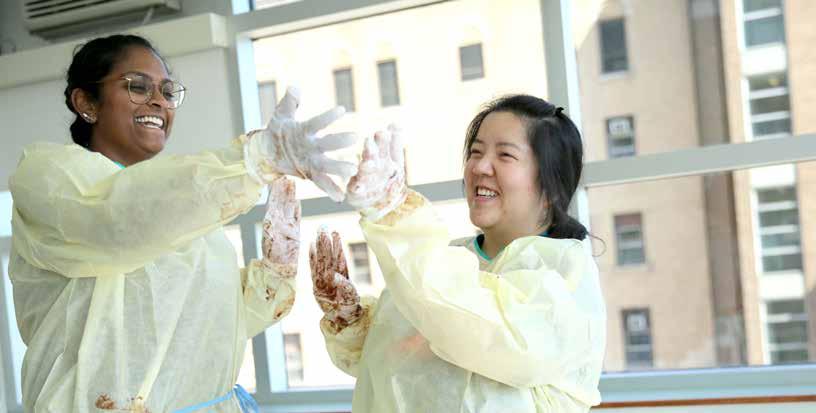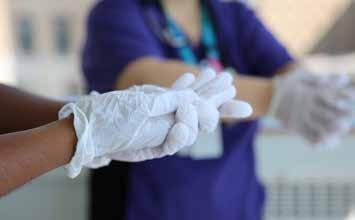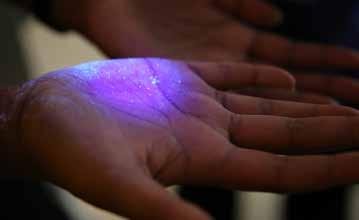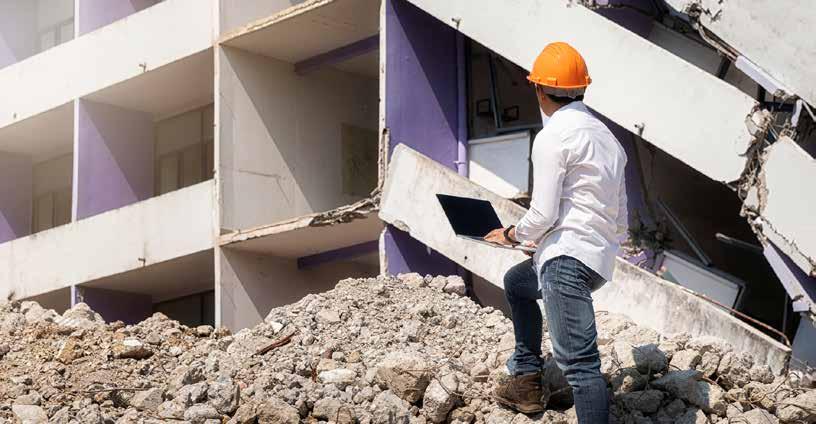
4 minute read
Proof is in the Pudding
THE PUDDING PROOF IS IN
St. Joseph’s Health Centre makes infection prevention fun with IPAC Olympics
Advertisement
By Amber Daugherty
It’s not everyday that Dianagris Balakrishnan finds herself covered in pudding at work. But one day last summer, she had so much of it on her personal protective equipment (PPE) gown and gloves that it was dripping onto the floor. The pudding had been spread by Cameron Thomas, an infection prevention practitioner, as part of an education session called the IPAC Olympics. Balakrishnan’s task was to remove the gown and gloves without getting any pudding on her skin or clothes underneath.
“It was gross,” says the registered practical nurse, laughing. “But it was a good reminder that there’s a lot of other stuff we could have on us when we leave a patient’s room.”
The game was meant to mimic the potential for transmission of all types of bacteria by nurses and other healthcare providers. Walking in and out of different patients’ spaces means providers may be taking more than they’d like when they leave, potentially
spreading something to other areas of the unit, patients or themselves. This can be especially dangerous for those with a weakened immune system and during high volume times like flu season.
The PPE and pudding game was just one of four that was brought to the Morrow wing on the fourth floor of St. Joseph’s Health Centre to help engage staff and visually show the significance of proper infection prevention practices.
“Working in healthcare means you get the same information over and over again but the message gets lost because it’s always the same — clean your hands, clean shared equipment,” says the unit’s educator, Rosalyn Espiritu. “I heard other hospitals had tried this interactive way of providing education and thought it would be impactful here because it’s new and exciting. People came over curious about why there was pudding on the table.”
A common issue in healthcare is people use gloves for extended periods of time, often instead of regular hand hygiene. So, in another game, staff members put gloves on and had Glo Germ powder — a visual tool used in cleaning education that shows up only under ultraviolet (UV) light — sprinkled on top. They rubbed their hands together to mimic the friction of providing care and then had to remove the gloves without contaminating themselves. Thomas then used a UV light to see if any powder remained.
“When I took the gloves off, I could still see some spots on my arms,” says Vina Magno, a registered nurse on the unit. “It’s so scary because normally we can’t see what’s there.”
Many staff members also had the powder on their fingers and hands because of defects in the gloves.
“People have a mistaken idea that gloves are impermeable and that’s why they don’t need to be as good about hand hygiene when wearing them,” says Thomas. “Staff were surprised to see powder on their hands


LEFT: Gloves protect from infection and contamination but proper hand hygiene is necessary upon removal as they are not impermeable. RIGHT: Glow Germ powder on one healthcare worker's hand illustrates that micro-organisms can get through protective gloves. t
and the reality is that Glo Germ is still bigger than micro-organisms that could get through, which is why it’s so important that gloves be used in addition to really good hand hygiene.”
Feedback on the IPAC Olympics was overwhelmingly positive from staff on the Morrow wing, known internally as 4M, so much so that other units have requested a shot at playing the games, which also included one related to cleaning shared equipment and another that tracked bacteria growth in microlab plates before and after practicing hand hygiene. The infection prevention team is exploring ways to continue this work to engage all staff members who interact with patients in a way that will hopefully stay with them.
“A lot of the time, we talk in healthcare about the moments when you’re supposed to clean your hands but not really the why,” says Thomas. “But when you think about what
you touched last and what you’re touching next, it makes a lot more sense why you should stop and make sure your hands are clean. Maybe next time someone on 4M is taking their PPE off, they’ll think about the pudding and be aware that just because they can’t see something that could potentially be harmful, it doesn’t mean it’s not there.”
Amber Daugherty is a senior communications advisor at Unity Health Toronto.
CHES SCISS Canadian Healthcare Engineering Society Société canadienne d'ingénierie des services de santé
CALL FOR NOMINATIONS FOR AWARDS
2020 Hans Burgers Award for Outstanding Contribution to Healthcare Engineering DEADLINE: April 30, 2020
To nominate: Please use the nomination form posted on the CHES website and refer to the Terms of Reference.
Purpose: The award shall be presented to a resident of Canada as a mark of recognition of outstanding achievement in the field of healthcare engineering.
Award sponsored by 2020 Wayne McLellan Award of Excellence in Healthcare Facilities Management DEADLINE: April 30, 2020
To nominate: Please use the nomination form posted on the CHES website and refer to the Terms of Reference.
Purpose: To recognize hospitals or long-term care facilities that have demonstrated outstanding success in completion of a major capital project, energy efficiency program environmental stewardship program or team building exercise.
Award sponsored by










